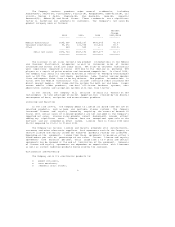Audiovox 2004 Annual Report Download - page 21
Download and view the complete annual report
Please find page 21 of the 2004 Audiovox annual report below. You can navigate through the pages in the report by either clicking on the pages listed below, or by using the keyword search tool below to find specific information within the annual report.frequency of their promotional activities or if the effectiveness of these
promotional activities declined, particularly around the holiday season, it
could have a material adverse effect on our annual financial results.
A Decline in General Economic Conditions Could Lead to Reduced Consumer Demand
for the Discretionary Products We Sell.
Consumer spending patterns, especially discretionary spending for products
such as mobile and consumer electronics , are affected by, among other things,
prevailing economic conditions, wage rates, inflation, consumer confidence and
consumer perception of economic conditions. A general slowdown in the U.S.
economy or an uncertain economic outlook could have a material adverse effect on
our sales.
We Depend Heavily on Existing Management and Key Personnel and Our Ability to
Recruit and Retain Qualified Personnel.
Our success depends on the continued efforts of John J. Shalam, C. Michael
Stoehr and Patrick Lavelle, each of whom has worked with Audiovox for over two
decades, as well as our other executive officers and key employees. We have no
employment contracts, with any of our executive officers or key employees. The
loss or interruption of the continued full−time service of certain of our
executive officers and key employees could have a material adverse effect on our
business.
In addition, to support our continued growth, we must effectively recruit,
develop and retain additional qualified personnel both domestically and
internationally. Our inability to attract and retain necessary qualified
personnel could have a material adverse effect on our business.
We Are Responsible for Product Warranties and Defects.
Even though we outsource manufacturing, we provide warranties for all of
our products for which we have provided an estimated liability. Therefore, we
are highly dependent on the quality of our suppliers. In addition, if we are
required to repair a significant amount of product, the value of the product
could decline while we are repairing the product.
Our Capital Resources May Not Be Sufficient to Meet Our Future Capital and
Liquidity Requirements.
We believe that we currently have sufficient resources to fund our existing
operations for the foreseeable future. However, we may need additional capital
to operate our business if:
o market conditions change,
o our business plans or assumptions change,
o we make significant acquisitions, and
o we need to make significant increases in capital expenditures or
working capital.
Our Stock Price Could Fluctuate Significantly.
The market price of our common stock could fluctuate significantly in
response to various factors and events, including:
o operating results being below market expectations,
o announcements of technological innovations or new products by us or
our competitors,
o loss of a major customer or supplier,
o changes in, or our failure to meet, financial estimates by securities
analysts,
18
























